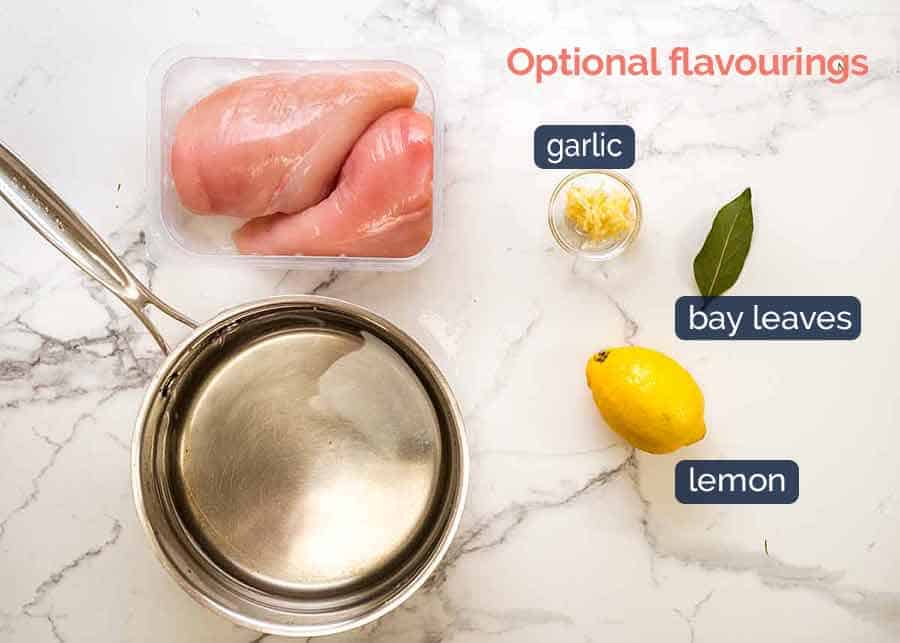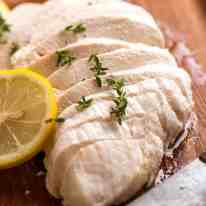What you need to make poached chicken
Fundamentally, all you need is chicken breast. However, it’s nice to add some flavorings to the poaching liquid if you plan to use the chicken without adding many other flavors.
You can include additional fresh or dried herbs and spices.
ADDING salt or other salted liquids, such as Worcestershire sauce or hot sauce, is not recommended. Using this method, the chicken may not cook all the way through because salt will change the temperature at which the water boils and cools.

When freshly prepared, chicken breast this juicy and succulent is even good eaten plain. But since there are so many dishes you can make with poached chicken, it’s helpful to have a supply on hand.
How Do You Know When The Chicken Breast is Cooked?
Wondering exactly how long to poach chicken breasts to ensure moist, tender, perfect meat? As ever, the best way to check for doneness is to use a meat thermometer. After about ten minutes, you’ll want to stick an instant-read meat thermometer (this is our favorite) into the thickest part of the chicken breast. Once you get a reading of 165°F, consider that chicken poached!
As healthy as any food can be, boneless, skinless, perfectly poached chicken breasts are the best. You can use skinless breasts without losing any juiciness because no fat is added during the cooking process, and the chicken retains plenty of moisture from its gentle simmer in the poaching liquid. Poached chicken breast is a lean, mean, delicious protein machine.
Play around with the poaching liquid in this poached chicken recipe to create one that is exactly to your liking and fulfill all of your dreams of juicy, boneless, skinless chicken breast. However, you can also flavor it with herbs and spices. A simple poaching liquid—just water and salt—yields a final product that is straightforward and adaptable. Our favorite add-ins include:
Watch how to make it
This recipe features in my debut cookbook Dinner. The majority of the recipes in the book are brand-new, but by popular demand, we included this reader favorite!
For all of the most recent updates, sign up for my newsletter and follow me on Facebook, Pinterest, and Instagram.

FAQ
How long does it take to poach boneless skinless chicken breasts?
In the hot water, the chicken breasts will continue to simmer gently. Remove the chicken breasts from the water when the old-fashioned instant-read thermometer reads 150 degrees for the internal temperature. It will typically take 5 to 10 minutes, but bear in mind that the timing will vary depending on how big or small the chicken breasts are.
How long does it take to poach a chicken breast?
When poaching chicken breasts over a very low heat on the stove, it should take about 10 to 12 minutes, or until the juices run clear when pierced in the thickest part. It might take a little longer if your pan is small or the chicken breasts are very large.
Why are poached chicken breasts tough?
Wait until the liquid in the cooking comes to a very low simmer without turning up the heat. This will take a few minutes, but it ensures that the chicken remains tender and soft. The chicken may become tough if the heat is increased at this point to expedite the simmer.
Why is my poached chicken dry?
Don’t Overcook Chicken Yes, even when poaching it, you can overcook it. It takes a while, but it can happen. Overcooked chicken is rubbery or chewy, shrinks in size, and is dry. When chicken is cooked past 165 degrees Fahrenheit, this occurs.